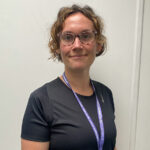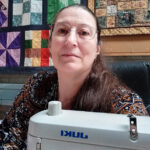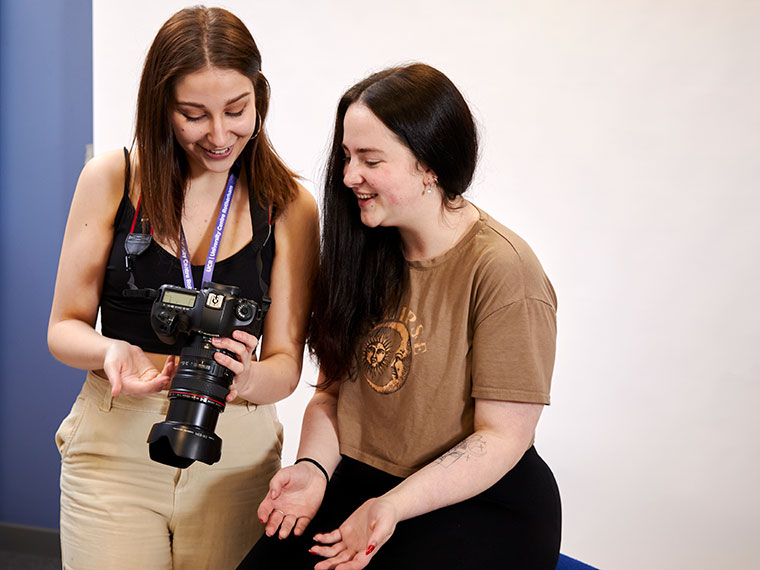
Spotlight on… Media, Moving Image and Photography Department
Love capturing moments on camera or dreaming up scenes for film? Then your life’s screenplay could direct you towards a career in media and photography.
Whether you’re into photography, filmmaking or content creation, being able to confidently use a camera is just the starting point.
Find out how University Centre Rotherham’s media, moving image and photography department could help you develop the skills needed to cut it in this exciting industry.
What is a career in media and photography and where could I work?
A career in media and photography is one of the most dynamic, creative, and highly visual paths you can take. You’ll tell stories, communicate ideas, or capture real-life moments through images, video, and multimedia.
“Storytelling is a primal thing. Humans have been doing it for a millennia,” says University Centre Rotherham’s cinematography lecturer, James Poulton. “What’s important is how we harness that power with a camera and the imagination to bring a story to life.”
Your career could span many industries, from journalism and fashion to branding and advertising, film and TV to social media and content creation.
On the photography side you could work freelance, being hired by studios, media companies, newspapers, or agencies. You might specialise in commercial photography, such as product, advertising and estate agency work, photojournalism and drone photography.
You could also set up your own studio or business, offering portrait, wedding and events photography. Some photographers follow a more artistic pathway, using photography as a fine art medium by exhibiting in galleries.
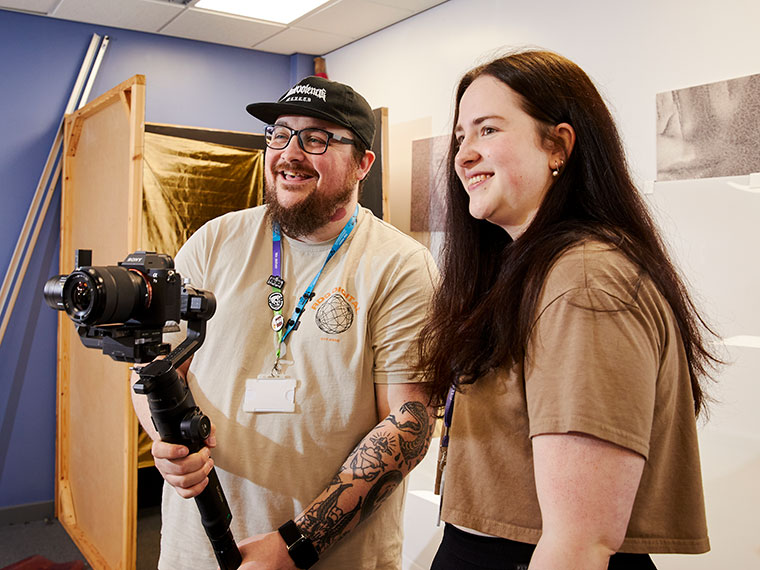
Stepping away from the camera, other roles in photography include digital editing, design, and marketing.
On the media side, you could work for production companies, broadcasters like the BBC or Netflix, creative agencies, or as a freelancer.
There are so many roles within TV, film and digital content, from planning and producing to editing and distribution.
If you’re interested in filmmaking, you could work as a director or cinematographer, while TV production roles include camera operators, producers, or floor managers.
Away from the camera, there are jobs in audiovisual, sound design, visual effects, motion graphic design, editing, screenwriting and script development.
Here at University Centre Rotherham, we have had many students who have forged successful careers within the industry.
Jordan-Kane Lewis is an award-winning filmmaker, Emily Coggins is a content creator for Manchester United, and recent graduate Abbie Walton is a wedding and events photographer who has launched a collaborative networking group for suppliers in her industry.
What could I study at University Centre Rotherham?
At University Centre Rotherham, we offer a BA Honours degree in Media, Moving Image and Photography.
This is a three-year course delivered full-time at our Rotherham town centre campus. It’s accredited by the University of Hull and you’ll need a level 3 qualification in a relevant subject to apply, along with a showreel or portfolio of work.
The course is aimed at people who are interested in a career in TV, film, photography, or media. It’s designed to improve your skills from beginner up to industry standard.
The first year focuses on fundamental skills, the second year tests your creativity through different briefs, and the final year encourages you to think professionally by curating an exhibition of your work.
The degree is split into two pathways: media/moving image, and photography, with some core modules that are taught to all students and soe pathway-specific ones.
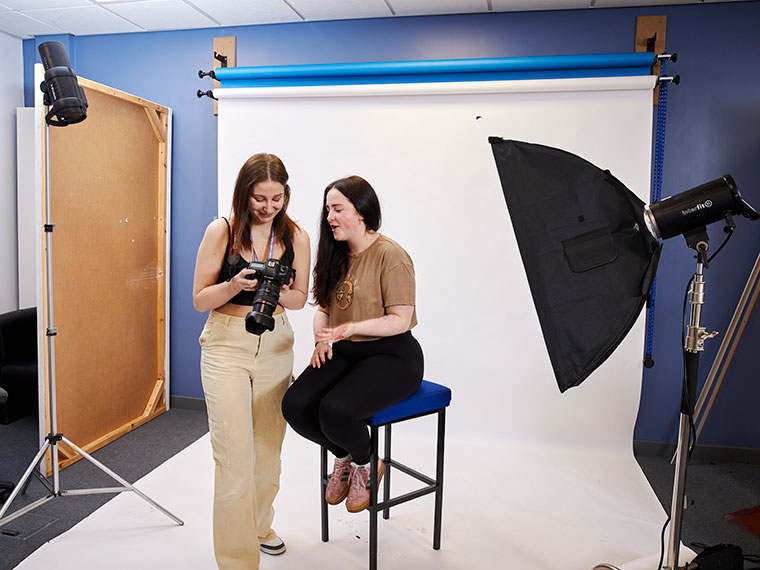
Specialist modules include how to use single and multi-cam operations, traditional versus digital photography, image manipulation, sound design and script writing, and different photographic genres.
“We don’t just teach you the basics,” says James. “We teach you how to use those skills practically so you can hit the ground running when you graduate.”
One of the best things about the media and photography degree at University Centre Rotherham is how broad the course content is. Other larger universities generally offer creative degrees like film studies or film production, which can be quite specific to that one area.
Being able to learn about the whole spectrum of the industry helps discover your strongest skills and pursue the pathway that best suits you. You might fancy yourself as the next Spielberg or Scorsese but, after starting your degree, realise you actually prefer sound design or scriptwriting.
“The course is tailored to each individual learner,” says program leader, Kasey Windle-Heath. “The modules allow you to find yourself and where you want to go, and finesse your skills to follow that pathway.”
Isn’t a degree all theory work? Will I do any practical work?
Think all you need to work in media and photography is just a camera and some inspiration? People make decent content with just a phone and a tripod these days. But having a successful career takes so much more than that.
The bachelor’s degree here at University Centre Rotherham blends theory work and independent study with lots of time behind the camera.
The theoretical side of learning teaches you how to create content that is not only visually striking, but also meaningful and impactful.
Modules like historical context help you appreciate how camera technology and processes have evolved over the years, inspiring you to experiment with different techniques in your own work.
Throughout your time at university, you’ll be set various briefs and projects, including some for real clients.
Photography students will try their hand at traditional processing in our dark room, conduct portrait or product photo shoots in the studio, and get out into the field for documentary style photography. In the second year, learners create an artist book – a project that encourages you to think outside the box about how to display your work.
Our film and TV students pitch ideas, write scripts, produce single and multi-cam films, and practice Foley sound effects using random objects and vegetables. There’s also a three-day residential trip to the coast to make a film.
This year, the department organised a 72-hour film challenge, collaborating with other creative departments including performing arts, music and graphic design. Students were put into groups, given a kit box and had 72 hours to create a film, musical score, behind-the-scenes photos, and film poster.
Outside the classroom, students are encouraged to seek freelance work. The department has developed strong links with businesses across South Yorkshire, such as Kelham Studio in Sheffield, Seven Studios in Doncaster, and Wentworth Woodhouse in Rotherham.
And at the end of each year, our teaching team holds an Oscars-style awards night in the Eastwood Theatre with clapper board prizes for categories like ‘best director’, ‘most creative’ ‘being different’, and most caring’.
What kind of equipment will I have access to?
We’re proud to have some fantastic, industry-standard facilities here at University Centre Rotherham.
There is a fully-functioning TV studio with separate directors’ gallery, a radio production and podcasting system, an editing suite, traditional dark room, and digital photography studio.
The department is kitted out with high-spec equipment such as Blackmagic 4K camcorders with cinematic lenses, plus with a range of DSLRs by Nikon, Panasonic and Sony. We’re continually investing in equipment and hoping to introduce new mirror lenses for the 2025 academic year.
For editing and post-production, our digital suites have Alienware PCs and high resolution OLED monitors.
“We’re all visually creative people so we want our learners to have access to the best equipment to practice their craft,” says Kasey.
All equipment and facilities can be booked out by students throughout the year, including the summer months, so learners can continue to develop their skills or work on projects even while the campus is closed.
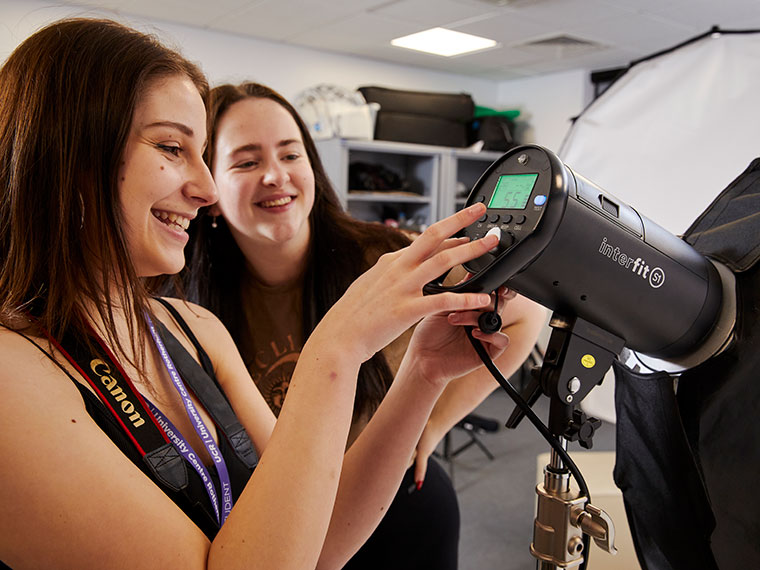
What industry experience do lecturers have?
All staff members in the media and photography department work in industry. Kasey is a photographer, James runs a film and video production company, and Ryan Gleeson is a sports photographer and videographer.
Their experience means they can teach you things not in a textbook, showing you the tricks of the trade you while giving you autonomy to teach yourself.
They’ll push you to do better, invest in your learning, and reach that industry standard so that you have the best possible chance of securing the job role you deserve.
Fun fact: All three are also a product of the RNN Group. They all went to Rotherham College to do their level 3 course, did this very BA degree at University Centre Rotherham, and went on to do their PGCE here afterwards to become teachers.
“We’ve all been through the same experiences as our learners, and we try and bond with each individual as much as possible. We want them to feel like we’re accessible, that they can come and speak with us whenever they want, which you don’t get at traditional universities. We’re a course that cares,” says James.
What do our students love about University Centre Rotherham?
As well as the amazing facilities, flexibility, accessibility and affordability are our top selling points.
Studying at University Centre Rotherham enables you to achieve a creative HE qualification near you, without moving away from home. Working or got a family to look after? The course is delivered over two or three days, so it’s a flexible way to learn.
Sofia Bell“Studying at University Centre Rotherham enables you to achieve a creative HE qualification near you, without moving away from home.”
There’s a good internal progression from further education study at Rotherham College, but the degree programme also attracts mature learners who want to retrain in photography or filmmaking. We’ve had students who spent years as beauticians before deciding to retrain, and the oldest applicant we’ve had was 66.
As well as being physically accessible, located within Rotherham town centre, the course structure has been designed in a way that benefits neurodiverse students.
Recent graduate Sofia Bell liked the smaller class sizes, high-end equipment and specialised facilities for media and photography degree students. So much so, she travelled from Swindon each week to complete her degree.
“I didn’t like the thought of big class sizes, so University Centre Rotherham seemed better suited for me. Because of the smaller class sizes, you network and connect with everyone on the degree, and here you’re not a number, you are a person,” she says. “The tutors are proud to showcase what their students have done. That’s what makes this place different from a traditional university.”
With experience on both side, as a student and tutor, James says that University Centre Rotherham is invaluable for local people: “What we offer here is so important. It gives people opportunities they wouldn’t have otherwise had. I wouldn’t have succeeded in getting a degree if it wasn’t for this place. And if I didn’t love it, I wouldn’t still be here all these years later.”
Find out more about media and photography at University Centre Rotherham



